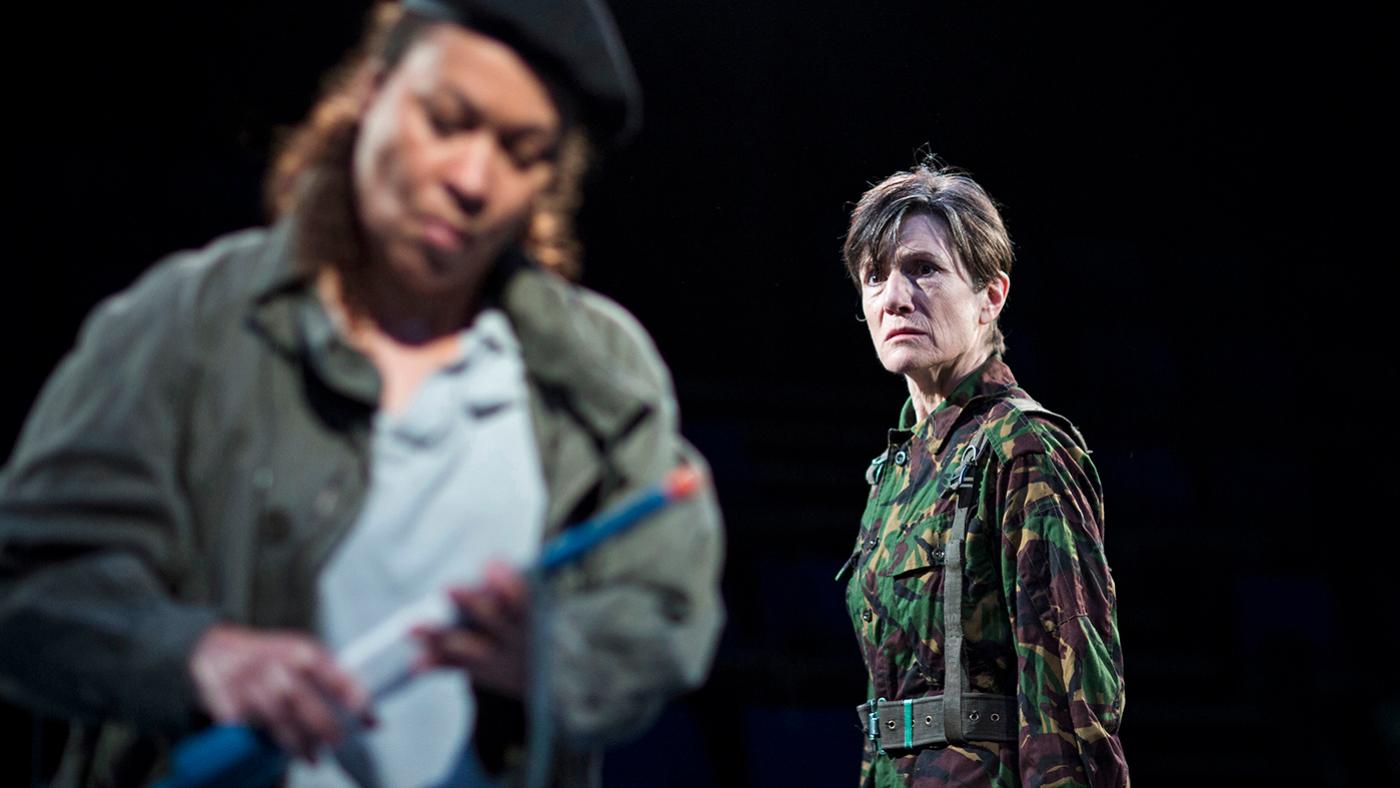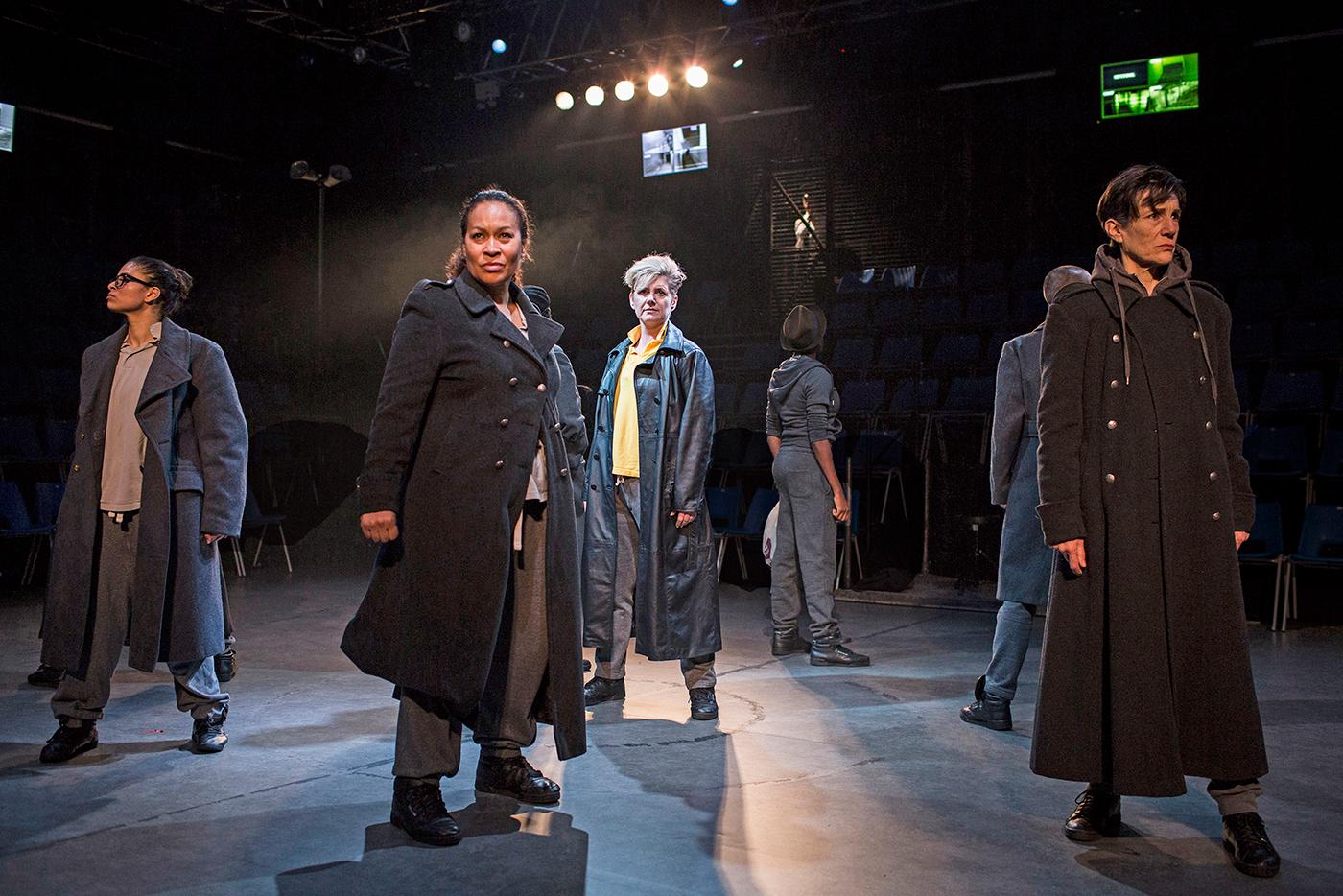An All-Female 'Julius Caesar' Set in a Women's Prison
Daniel Hautzinger
March 28, 2019

Great Performances: Julius Caesar airs Friday, March 29 at 9:00 pm and will be available to stream the following day.
Shakespeare’s plays were originally performed only by men: women’s parts were taken by boys. So why not do the opposite and give all the parts to women? That’s what director Phyllida Lloyd did in an acclaimed trilogy of productions that originated at London’s Donmar Warehouse. She set Julius Caesar, Henry IV, and The Tempest in a women’s prison, with inspiration from a collaboration between actors, prisoners, and the production team in partnership with the theater company Clean Break and the York St. John University Prison Partnership Project.
On Friday, March 29 at 9:00 pm or via streaming the following day, you can watch Lloyd’s production of Julius Caesar, starring Harriet Walter as Brutus, Jackie Clune as Caesar, and Martina Laird as Cassius. We talked to Mary Beth Rose, professor emerita of English at the University of Illinois at Chicago, about the production, whether the all-female casting matters, and how the prison setting affects the play.
Note: This conversation has been edited and condensed for clarity.
What did you think of the production?
I thought it was really interesting, very vigorous and excellent. I thought the prison setting was very effective.
Do you think the prison setting is more important to the production than the all-female casting?
Shakespeare’s casting in Elizabethan England was always non-normative, in that the actors were all male. So, in our modern terminology, it’s always been queer in that it’s non-normative, in terms of traditional gender roles. The most extreme example comes in As You Like It, where you have a man playing a woman playing a man playing a woman. So I have to say, I didn’t find the gender casting to be overwhelmingly meaningful.
 Phyllida Lloyd's all-female production of 'Julius Caesar.' Photo: Helen Maybanks
Phyllida Lloyd's all-female production of 'Julius Caesar.' Photo: Helen Maybanks
In contrast, in Hamilton, having people of color play the founding fathers is very striking because it has huge thematic significance, because it says everyone has a stake in America, and it symbolizes that for you; it makes it real. Whereas I think gender casting in Shakespeare – I’ve also seen all-male productions, like Mark Rylance’s Twelfth Night – I don’t think about it very much when I’m watching.
To be sure, Julius Caesar is a really masculinist play. There are only two women in it. When you see Caesar at the beginning with this really witty swagger and bravado in this production, it’s really fun that she’s a woman. But as the play went on, I didn’t think much about it.
Why is the prison setting so effective?
Julius Caesar is a play about political freedom and the desire to escape tyranny, or at least the fear of tyranny, to not be slaves. There’s the famous quotation from Cassius, “The fault, dear Brutus, is not in our stars, but in ourselves, that we are underlings.” So the whole play is about, in a sense, being in a prison, and how Brutus and Cassius make this huge decision to assassinate Caesar and to retrieve the republic, which to them is synonymous with freedom. So the prison setting, with the interruptions by the guards and the guards’ return at the end, adds to this feeling of being trapped.
Brutus and Cassius are destroyed and destroy themselves by being trapped in their own delusions and errors. Brutus and Cassius don’t win, and they can’t even capture the meaning of the play; Antony takes away the power of interpretation from Brutus. Brutus wants to interpret the assassination as this work of art, this sculpture for the gods, but then Antony comes in, and says essentially, “Well, this is a bloody corpse,” in that famous scene. So I think Brutus and Cassius, and especially Brutus, never get out of their prison, and the prison setting makes that really clear.
 Jade Anouka as Mark Antony in Phyllida Lloyd's production of 'Julius Caesar.' Photo: Helen Maybanks
Jade Anouka as Mark Antony in Phyllida Lloyd's production of 'Julius Caesar.' Photo: Helen Maybanks
At the end the guards come in and make the prisoners stop the play, and Harriet Walter as Brutus starts sobbing, saying, “We never get a chance to finish, this is so unfair.” That’s how you kind of feel: Brutus doesn’t ever get a chance to explain who he is, because Antony takes it away. Antony comes in at the end and gives a beautiful and moving soliloquy about Brutus after Brutus kills himself. But what Antony is really saying in that soliloquy is “Brutus meant well, but what he did is really wrong.” So he grabs the glory of the last word. The prison setting just illustrates this attempted escape from slavery and the failure of that escape. That’s why I think this production is successful. The way the prisoner playing Brutus yells at the end of this production that “We haven’t finished!” – that’s what death is like, isn’t it?
Does this production have specific resonance for our era and the issues of our time?
I think it brings up the fact of female imprisonment, which cannot help but be noticed. The fact of mass incarceration. What the drama will do is make vivid what might remain abstract for someone who hasn’t had those experiences, who has only read about them in the newspaper. So it gets you not only to think about it but to feel it. And that is what drama can do.







